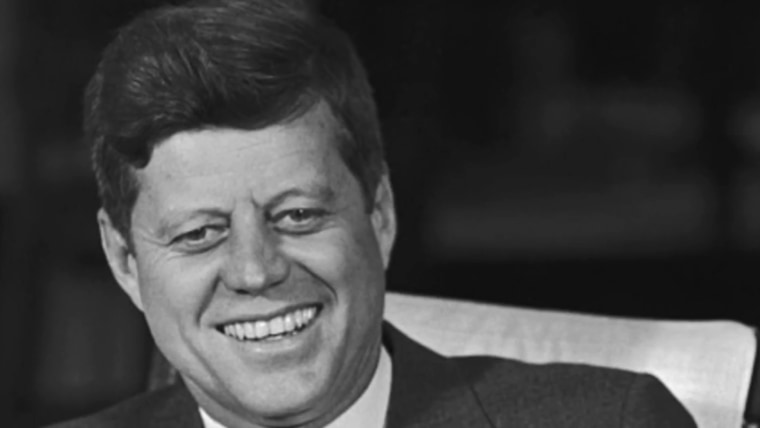Voters in poll want Biden to release JFK assassination records
More than 7 in 10 voters want President Joe Biden to honor a commitment he made last year and release the final trove of JFK assassination records on Dec. 15, according to a poll released Tuesday in coordination with a research group that sued the administration to force more document disclosure.
About 16,000 of the most closely guarded government secrets into the assassination nearly 60 years ago still remain hidden — including 44 records that would shed light on a covert Cuba-related CIA program that involved Lee Harvey Oswald less than four months before he shot President John F. Kennedy, according to Jefferson Morley, vice president of the nonpartisan Mary Ferrell Foundation, the nation’s largest online source of JFK assassination records. The group sued Biden in October to disclose the records.
The federal suit came one year after Biden issued a memo delaying the documents’ release until this month — unless federal agencies persuaded him to give them even more time. Biden’s predecessor, Donald Trump, first postponed the disclosure in 2017, when the records were supposed to be fully released under the President John F. Kennedy Assassination Records Collection Act of 1992. Congress passed it unanimously in response to Oliver Stone’s Oscar-nominated film “JFK.”
If Biden made the documents public on Dec. 15, he would have broad bipartisan and bicoastal support, according to the survey of 2,000 U.S. voters conducted by the Democratic pollster Fernand Amandi, a JFK assassination history buff with the Miami-based consulting firm of Bendixen & Amandi International.
“There’s not a lot that unites a lot of American voters these days, but one of the few things that does is to see President Biden release the long-overdue JFK files as he promised a year go,” said Amandi, who presented his poll findings Tuesday alongside Morley at the National Press Club in Washington.
The poll shows that 71 percent of voters say the records should be released, and only 10 percent say the release should be delayed again if the CIA or FBI requests it. Support for disclosure is strongest among Republicans and young people.
Half of voters believe the assassination involved multiple conspirators while 38 percent said Oswald was the lone gunman, the poll showed. It also showed regional variations, with Northeastern voters least likely to believe that Oswald acted with others while Southwestern voters believed in other conspirators by double-digit margins.
Spokespeople for the White House, CIA, FBI and National Archives and Records Administration, which is in charge of the documents, did not immediately respond to requests for comment.
Ever since the assassination, polling from Gallup shows, a majority of Americans, or close to it, have believed that others besides Oswald were involved in the killing. But the numbers have fluctuated.
In Gallup’s polling, support for the lone gunman theory was highest in the mid-1960s, at 36 percent, while 50 percent said others were involved. For years afterward, support for the lone gunman theory bottomed out in the low double digits while belief in other conspirators ranged from 70 percent to 80 percent. The margins then began to tighten in the early 2000s.
Of those who believe Oswald was part of a conspiracy, Amandi’s poll showed, 31 percent believe the CIA was involved, 13 percent the mafia, 7 percent the Cuban government, and 6 percent the Soviet Union.
The CIA has played a central role in covering up information about the JFK assassination over the years.
The agency lobbied Biden and Trump to not release records, and for decades it misled the public and congressionally appointed investigators about its contacts and knowledge of Oswald, and about the activities of various government agents, notably George Joannides, a Miami-based case officer who guided and monitored an anti-Fidel Castro group called “Directorio Revolucionario Estudantil” (Revolutionary Student Directorate), according to Morley’s research and reporting and other historians who relied on the JFK Records Act.
Known by its initials DRE, the group came into contact with Oswald in New Orleans on Aug. 5, 1963, when he suddenly became identified with a pro-Castro group called the Fair Play for Cuba Committee, the records show.
As Oswald became known as a pro-Castro activist in 1963, the Pentagon was formulating a plan called Operation Northwoods to stage a false flag attack in the United States to blame on Cuba and justify a military confrontation to make up for the aborted Bay of Pigs fiasco two years before. Immediately after JFK’s assassination, Oswald was identified as a pro-Castro sympathizer, thanks to news articles and documentation that arose when he came into contact with Joannides’ group.
But most of the records, which Morley discovered in other lawsuits, are still sealed.
“What are they hiding? There’s 44 documents that we know exist, that are assassination-related but have not been released. And they relate to covert programs in which George Joannides was involved,” Morley said in an interview. “There was authorized operational activity around Oswald before the assassination. And that’s what’s in these withheld documents.”
One of the withheld records concerns why Joannides was given a Career Intelligence Medal in a secret 1982 ceremony, Morley said. He said Joannides retired officially from the agency in 1975, but came back to work three years later as a CIA-appointed liaison to congressional investigators. Those investigators had been lied to when they were told that Joannides was not involved in any activities that were under scrutiny related to the assassination. Joannides died in 1990 at 68.
“He didn’t get the medal before he stonewalled Congress. He got it after he stonewalled Congress,” Morley said. “And what’s being hidden from the public is why he got the medal.”
Morley, a former Washington Post reporter, determined the exact number and type of records concerning the program through another open records lawsuit in which the CIA described the contents of the documents in vague, general terms.
Amandi called Morley’s research a “paradigm shift” in understanding just how closely tied the CIA was to Oswald prior to the assassination.
Former CIA agent and JFK lecturer Rolf Mowatt-Larssen, who is critical of his former agency, said the information that he, Morley and others have dug up — thanks in large part to the JFK Records Act — show that it’s time to release the records. He said there’s no justification for redacting records based on “sources and methods” six decades ago.
“The poll results don’t surprise me. People want the government to tell them the truth,” Mowatt-Larssen said. “There’s not been a time in my life when trust in government has been this low, so why not disclose?”



